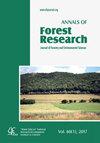Development of a wood damage monitoring system for mechanized harvesting
IF 2.9
3区 农林科学
Q2 FORESTRY
引用次数: 6
Abstract
Cut-to-length harvesting is a cost-efficient method of the wood supply chain. However, it risks causing stem damage in the mechanized process of thinning forest stands, thereby reducing the growth and technical quality of the remaining trees, which would then be exposed on the increased vulnerability to fungal diseases. For these reasons, it is critical to support quality monitoring of harvesting machines. One way to support quality monitoring is through the application of machine vision solutions. In this study, the damaged stems were photographed systematically from a strip road. The success of the stem-damage detection was analyzed to determine the relationships between successful detection, stand condition, and the image-processing technique. Statistically meaningful relationships were identified via logistic regression analysis, which can be used in selection of tailored image processing technique. The study indicated that the quality-monitoring system of mechanized harvesting could be improved by an increased focus on developing the multi-view photogrammetry of stem damages according to different stand conditions. Further, refining the machine learning system would support the need to determine accurate image-processing thresholds of the texture of stem damages. Then, the overall proportion of successful stem-damage detections will be 89%. These improvements of the quality monitoring system will provide the efficient thinning process in the sustainable wood supply from forests to forest industry. The implementation of such a system could be much broader, initially under Nordic conditions and then in other countries as well, given that its development takes into considerations the significant calibration factors of local conditions.机械化采伐木材损伤监测系统的研制
按长度采伐是木材供应链中一种具有成本效益的方法。然而,它有可能在疏伐林分的机械化过程中造成树干损伤,从而降低剩余树木的生长和技术质量,从而增加其对真菌疾病的易感性。出于这些原因,支持收割机器的质量监控至关重要。支持质量监控的一种方法是通过应用机器视觉解决方案。在这项研究中,受损的树干是从一条带状道路上系统拍摄的。对茎损伤检测的成功进行了分析,以确定成功检测、林分条件和图像处理技术之间的关系。通过逻辑回归分析确定了具有统计学意义的关系,可用于选择定制的图像处理技术。研究表明,根据不同林分条件,加强对树干损伤的多视角摄影测量,可以改善机械化采伐质量监测系统。此外,完善机器学习系统将支持确定茎损伤纹理的精确图像处理阈值的需要。然后,成功检测茎损伤的总体比例将达到89%。质量监测系统的这些改进将为从森林到林业的可持续木材供应提供有效的疏伐过程。这种制度的实施范围可能要广泛得多,最初是在北欧条件下,然后在其他国家实施,因为它的发展考虑到了当地条件的重要校准因素。
本文章由计算机程序翻译,如有差异,请以英文原文为准。
求助全文
约1分钟内获得全文
求助全文
来源期刊

Annals of Forest Research
FORESTRY-
CiteScore
2.20
自引率
11.10%
发文量
11
审稿时长
12 weeks
期刊介绍:
Annals of Forest Research is a semestrial open access journal, which publishes research articles, research notes and critical review papers, exclusively in English, on topics dealing with forestry and environmental sciences. The journal promotes high scientific level articles, by following international editorial conventions and by applying a peer-review selection process.
 求助内容:
求助内容: 应助结果提醒方式:
应助结果提醒方式:


